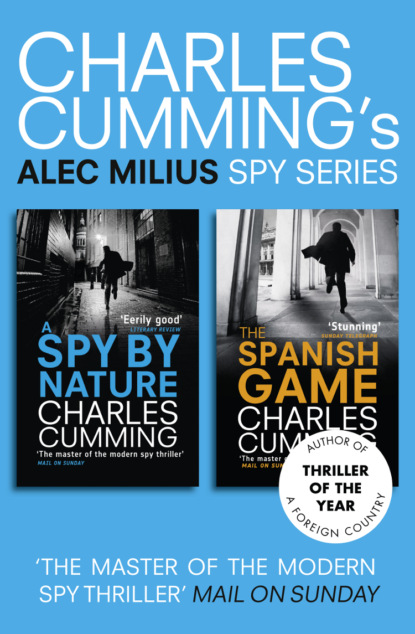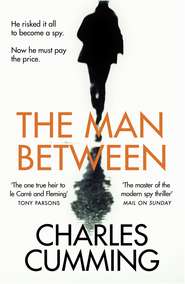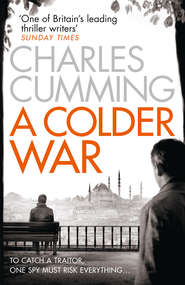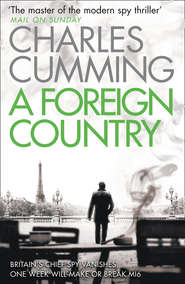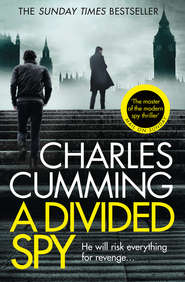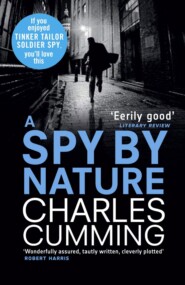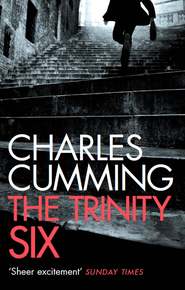По всем вопросам обращайтесь на: info@litportal.ru
(©) 2003-2024.
✖
Alec Milius Spy Series Books 1 and 2: A Spy By Nature, The Spanish Game
Автор
Год написания книги
2019
Настройки чтения
Размер шрифта
Высота строк
Поля
Thirty-Two: End of the Affair (#litres_trial_promo)
Thirty-Three: Caccia (#litres_trial_promo)
Thirty-Four: Think (#litres_trial_promo)
Thirty-Five: Fast Release (#litres_trial_promo)
Thirty-Six: West (#litres_trial_promo)
Epigraph
I remember, in fact, the Lebanese woman I knew at Berkshire College saying to me, after I told her how much I loved her: ‘I’ll always tell you the truth, unless of course I’m lying to you.’
Richard Ford, The Sportswriter
Author’s Note
Were the events of this story entirely true, they would inevitably breach clauses in The Official Secrets Act. Nevertheless, members of the intelligence community both in London and in the United States may find that they catch their reflection in the account which follows.
–C.C.
London, 2001
PART ONE
1995
If we hope to live not just from moment to moment, but in true consciousness of our existence, then our greatest need and most difficult achievement is to find meaning in our lives.
—Bruno Bettelheim, The Uses of Enchantment
ONE
An Exploratory Conversation
The door leading into the building is plain and unadorned, save for one highly polished handle. No sign outside saying FOREIGN AND COMMONWEALTH OFFICE, no hint of top brass. There is a small ivory bell on the right-hand side, and I push it. The door, thicker and heavier than it appears, is opened by a fit-looking man of retirement age, a uniformed policeman on his last assignment.
‘Good afternoon, sir.’
‘Good afternoon. I have an interview with Mr Lucas at two o’clock.’
‘The name, sir?’
‘Alec Milius.’
‘Yes, sir.’
This almost condescending. I have to sign my name in a book and then he hands me a security dog tag on a silver chain, which I slip into the hip pocket of my suit trousers.
‘Just take a seat beyond the stairs. Someone will be down to see you in a moment.’
The wide, high-ceilinged hall beyond the reception area exudes all the splendour of imperial England. A vast panelled mirror dominates the far side of the room, flanked by oil portraits of grey-eyed, long-dead diplomats. Its soot-flecked glass reflects the bottom of a broad staircase, which drops down in right angles from an unseen upper storey, splitting left and right at ground level. Arranged around a varnished table beneath the mirror are two burgundy leather sofas, one of which is more or less completely occupied by an overweight, lonely-looking man in his late twenties. Carefully, he reads and rereads the same page of the same section of The Times, crossing and uncrossing his legs as his bowels swim in caffeine and nerves. I sit down on the sofa opposite his.
Five minutes pass.
On the table the fat man has laid down a strip of passport photographs, little colour squares of himself in a suit, probably taken in a booth at Waterloo station sometime early this morning. A copy of The Daily Telegraph lies folded and unread beside the photographs. Bland non-stories govern its front page: IRA hints at new ceasefire; rail sell-off will go ahead; 56 per cent of British policemen want to keep their traditional bobbies’ helmets. I catch the fat man looking at me, a quick spot-check glance between rivals. Then he looks away, shamed. His skin is drained of ultraviolet, a grey flannel face raised on nerd books and Panorama. Black oily Oxbridge hair.
‘Mr Milius?’
A young woman has appeared on the staircase wearing a neat red suit. She is unflustered, professional, demure. As I stand up, Fat Man eyes me with wounded suspicion, like someone on his lunch break cut in line at the bank.
‘If you’d like to come with me. Mr Lucas will see you now.’
This is where it begins. Following three steps behind her, garbling platitudes, adrenaline surging, her smooth calves lead me up out of the hall. More oil paintings line the ornate staircase.
Running a bit late today. Oh, that’s okay. Did you find us all right? Yes.
‘Mr Lucas is just in here.’
Prepare a face to meet the faces that you meet.
A firm handshake. Late thirties. I had expected someone older. Christ, his eyes are blue. I’ve never seen a blue like that. Lucas is dense boned and tanned, absurdly handsome in an old-fashioned way. He is in the process of growing a moustache, which undercuts the residual menace in his face. There are black tufts sprouting on his upper lip, cut-rate Errol Flynn.
He offers me a drink, an invitation seconded by the woman in red, who seems almost offended when I refuse.
‘Are you sure?’ she says, as if I have broken with sacred tradition. Never accept tea or coffee at an interview. They’ll see your hand shaking when you drink it.
‘Absolutely, yes.’
She withdraws and Lucas and I go into a large, sparsely furnished room nearby. He has not yet stopped looking at me, not out of laziness or rudeness but purely because he is a man entirely at ease when it comes to staring at people. He’s very good at it.
He says, ‘Thank you for coming today.’
And I say, ‘It’s a pleasure. Thank you for inviting me. It’s a great privilege to be here.’
There are two armchairs in the room, upholstered in the same burgundy leather as the sofas downstairs. A large bay window looks out over the tree-lined Mall, feeding weak, broken sunlight into the room. Lucas has a broad oak desk covered in neat piles of paper and a framed black-and-white photograph of a woman whom I take to be his wife.
‘Have a seat.’
I drop down low into the leather, my back to the window. There is a coffee table in front of me, an ashtray, and a closed red file. Lucas occupies the chair opposite mine. As he sits down, he reaches into the pocket of his jacket for a pen, retrieving a blue Mont Blanc. I watch him, freeing the trapped flaps of my jacket and bringing them back across my chest. The little physical tics that precede an interview.
‘Milius. It’s an unusual name.’
‘Yes.’
‘Your father, he was from the Eastern bloc?’
‘His father. Not mine. Came over from Lithuania in 1940. My family have lived in Britain ever since.’





